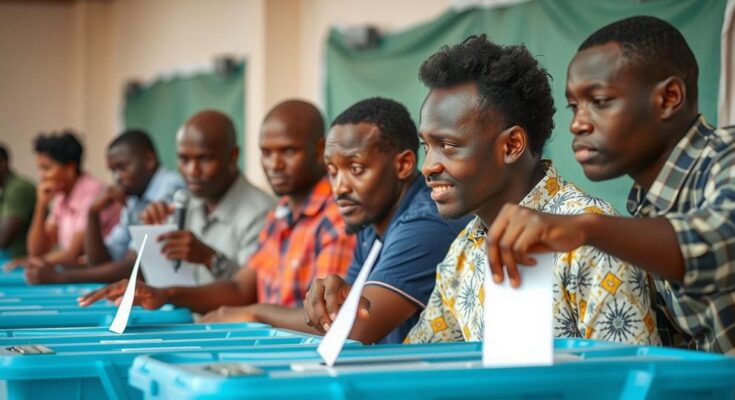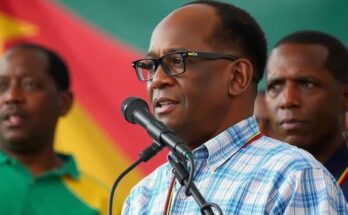Ghana’s general election on December 7, 2024, reflected critical public sentiment amid the country’s worst economic crisis in a generation. With approximately 18.7 million registered voters, the election has emerged as a two-horse race between Vice President Mahamudu Bawumia and former President John Dramani Mahama. Both candidates face significant scrutiny as the electorate grapples with high inflation and rising unemployment, leading to widespread dissatisfaction and calls for change as they cast their votes.
On December 7, 2024, Ghanaians participated in pivotal presidential and parliamentary elections amidst severe economic turmoil—the worst that the country has faced in a generation. Historically regarded as a model of democracy within the region, Ghana now finds itself grappling with rampant inflation and unemployment, leading to widespread dissatisfaction among its population. Approximately 18.7 million voters were registered to express their preferences amidst a challenging economic landscape, with officials expecting early results by late Saturday and official announcements by Tuesday.
The presidential contest has predominantly become a duel between the incumbent Vice President Mahamudu Bawumia, representing the ruling New Patriotic Party (NPP), and former President John Dramani Mahama of the National Democratic Congress (NDC). As Ghana’s economy falters, those candidates have provided limited optimism for change. Polls indicate a potential comeback for Mr. Mahama, with projections suggesting he could secure 52.2% of the vote against Mr. Bawumia’s anticipated 41.4%. Both parties make claims to represent differing political ideologies; however, their proposed solutions for the nation’s economic issues exhibit little distinction.
This election serves as a referendum not only on local leadership but also on the fate of Ghanaian democracy, which stands under threat from political instability sweeping across West Africa. As the country navigates through mounting economic pressures—largely due to a default on foreign debt and rampant inflation rates reaching 54%—the electorate’s mood has oscillated between hope and concern. Citizens have voiced apprehensions regarding the chronic issue of illegal gold mining, which has intensified due to economic desperation.
In their final campaign speeches, both candidates sought to articulate their visions to alleviate the nation’s myriad challenges. Mr. Bawumia pledged to build on existing efforts to stabilize the economy, while Mr. Mahama emphasized the necessity for a holistic “reset” of various sectors, including governance and the health system, to secure a prosperous future for Ghana. As Ghanaians cast their votes, the overarching hope for many is that the incoming leadership can effectively address the lingering economic distress that has dominated discourse leading up to this pivotal election.
The general elections in Ghana are crucial, occurring against the backdrop of the country’s most significant economic crisis in decades. Once a symbol of democratic stability in West Africa, Ghana has recently experienced heightened levels of inflation, job scarcity, and other socio-economic challenges, prompting public dissatisfaction. The elections are anticipated to be a crucial test for democracy in a region grappling with political instability, with a focus on the economic platforms presented by the candidates vying for leadership.
The December 2024 elections in Ghana represent a significant crossroads for the nation, poised to define its democratic resilience in the face of economic adversity. With key issues such as job creation, inflation, and governance at the forefront, the choices made by voters are expected to reflect their aspirations for change. The outcomes of these elections will not only determine Ghana’s immediate leadership but also its trajectory toward recovering from prolonged economic hardship.
Original Source: apnews.com




